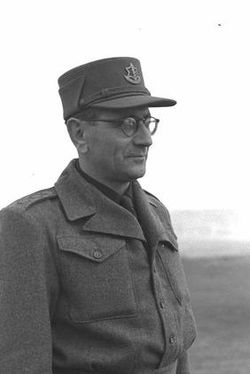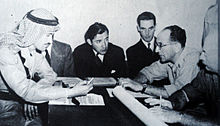- David Shaltiel
-
David Shaltiel (hebrew: דוד שאלתיאל, {B. 16 January 1903 Berlin - 1969 Jerusalem) was an Israeli military and intelligence officer, later also diplomat, and was most well known for being the district commander of the Haganah in Jerusalem during the 1948 Arab-Israeli war.
He was born in Berlin into a Portuguese orthodox Jewish family settled in Hamburg. At 16, Shaltiel joined the Zionist youth movement Blau Weiss, and he went to Palestine in 1923. However, he was not happy there, and returned to Europe in 1925. From 1925-1930 he was enlisted in the French Foreign Legion. In 1934 he returned to Palestine. There he started working for the Haganah, being charged with buying arms in Europe. In 1936 he was captured in Aachen, Germany, by Gestapo. Shaltiel spent the three next years in prisons/ concentration camps, including Dachau and Buchenwald. When he was sent to Berlin in 1939 the Haganah succeeded in freeing him. He then went back to Palestine. There he was at first condemned to death for murder by the British, but a British War Council later acquitted him. In 1942-43, he was the Haganah Commander in Haifa. Fulfilling also the office of commander of the Counterintelligence service - the "Ran" - and of the Intelligence Service - the Shin Yud - of the Haganah, he was involved in the conflicts between the Haganah and the other Jewish underground groups - Irgun and Lehi. Later, as Haganah's link to these organizations, Irgun, helped them coordinate several missions with the Haganah. Among them the widely condemned attack at Deir Yassin. In 1948, he was the local Haganah district commander when the village was attacked by Irgun and Lehi Jewish fighters despite a non-aggression pact signed between the Zionists and the Mukhtar of the village, the villagers wanting to remain neutral in the war. At first Shaltiel did not agree with attacking Deir Yassin, but after a day he surrendered and wrote a letter to them saying that he had "no objection to your carrying out the operation". Yitzchak Levi, head of the Jerusalem branch of Haganah Intelligence, proposed that the inhabitants should be notified that the truce was over, but Shaltiel then refused to endanger the operation by warning them.
He was also the mastermind behind Operation Kedem, which had the goal of capturing "East Jerusalem". The mission was carried out July 8, 1948 by Irgun troops and was a total failure. From that moment, he was, (according to himself), disgraced and his name was erased from official Israel history.
Between June 11 and July 21, 1948, he had a series of meetings, mediated by the UN, with Abdullah el Tell, the commander of Arab Legion troops in the Old City.
On July 7 they signed the "Mount Scopus Agreement" which stated that the Jewish enclave at Mount Scopus should be de-militarized and would come under UN supervision. On July 15 the Haganah and Irgun launched a massive bombardment on the Old City which was followed by infantry attacks on the New, Jaffa and Zion Gates. These failed to gain their objectives.[1] On 21 July Shaltiel and el Tell signed a formal cease-fire based on the existing positions of their forces.[2]
After the end of the Independence War, David Shaltiel founded the Border Corps of the Israeli army, the Heyl Hasfar, and was its first commander. Later, because of administrative problems, he recommanded to transfer these units into the frame of the Israeli Police, then they became known as Border Guard -Mishmar Hagvul. In the years 1950-1952 Shaltiel served as military attaché of Israel in France. and later fulfilled several diplomatic charges - as Israel's plenipotentiary minister in Brazil and Venezuela (1952–1956), then in Mexico (1956–1959) and ambassador in Netherlands (1963–1966). Died in Jerusalem in 1969.
Shaltiel was married twice - with Inge, then in 1942 with Yehudit, born Judith Irmgard Schonstedt (1913–2010), psychologist, daughter of a family of rabbis from Berlin. A little girl,Tamar, adopted by him and his second wife, had to be returned to her biological mother.
References
Collins/Lapierre: "O Jerusalem". 1973. History Book Club.
Dayan, Moshe: "The Story of My Life." 1976. ISBN 0-688-03076-9.
Lüth, Erich: David Shaltiel. Hamburger- Fremdenlegionär - Diplomat - Verteidiger von Jerusalem.
External links
Categories:- 1903 births
- 1969 deaths
- Israeli military personnel
- Jerusalem
- Sephardi Jews
Wikimedia Foundation. 2010.


